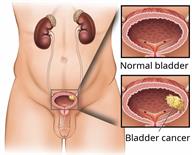Bladder Cancer

Bladder cancer is a condition where abnormal tissue (a tumor) grows in the bladder. The bladder is the organ that holds urine. Two tubes (ureters) carry urine from the kidneys to the bladder.
The bladder wall is made of layers of tissue. Cancer that spreads through these layers of the bladder wall becomes more difficult to treat.
What increases the risk?
The following factors may make you more likely to develop this condition:- Smoking.
- Working where there are risks (occupational exposures), such as working with rubber, leather, clothing fabric, dyes, chemicals, or paint.
- Being 55 years of age or older.
- Being male.
- Having long-term bladder inflammation.
- Having a history of cancer. This includes:
- A family history of bladder cancer.
- Having had bladder cancer before.
- Having had certain treatments for cancer before, such as:
- Medicines to kill cancer cells (chemotherapy).
- Strong X-ray beams or high-energy capsules to kill cancer cells and shrink tumors (radiation therapy).
- Having been exposed to arsenic. This is a poisonous substance.
What are the signs or symptoms?
Early symptoms of this condition include:- Blood in your urine.
- Pain when urinating.
- Infections of your urinary system (urinary tract infections or UTIs) that happen often.
- Having to urinate sooner or more often than normal.
- Not being able to urinate.
- Pain on one side of your lower back.
- Loss of appetite.
- Weight loss.
- Tiredness (fatigue).
- Swelling in your feet.
- Bone pain.
How is this diagnosed?
This condition is diagnosed based on:- Your medical history.
- A physical exam.
- Lab tests, such as urine tests.
- Imaging tests.
- Your symptoms.
- A cystoscopy. This involves putting a narrow tube into your urethra. The urethra is the organ that carries urine from your bladder to the outside of your body. This procedure is done to view the lining of your bladder for tumors.
- A biopsy. This involves removing a tissue sample to look at under a microscope to check for cancer.
- CT scan.
- MRI.
- Bone scan.
- X-ray.
How is this treated?
Your health care provider may recommend one or more types of treatment based on the stage of your cancer. The most common treatments are:- Surgery to remove the cancer. Types of surgeries include:
- Removing a tumor on the inside wall of the bladder (transurethral resection).
- Removing the bladder (cystectomy).
- Radiation therapy. This is often combined with chemotherapy.
- Chemotherapy.
- Immunotherapy. This uses medicines to help your body's disease-fighting system (immune system) destroy cancer cells.
Follow these instructions at home:
-
Take over-the-counter and prescription medicines only as told by your health care provider.
-
If you were prescribed an antibiotic medicine, take it as told by your health care provider. Do not stop using the antibiotic even if you start to feel better.
-
Eat a healthy diet. Some treatments might affect your appetite.
-
Do not use any products that contain nicotine or tobacco. These products include cigarettes, chewing tobacco, and vaping devices, such as e-cigarettes. If you need help quitting, ask your health care provider.
-
Consider joining a support group. This may help you learn to deal with the stress of having bladder cancer.
-
Tell your cancer care team if you develop side effects. Your team may be able to recommend ways to get relief.
-
Keep all follow-up visits. This is important.
Where to find more information
-
American Cancer Society (ACS): cancer.org
-
National Cancer Institute (NCI): cancer.gov
Contact a health care provider if:
- You have symptoms of a UTI. These include:
- Fever.
- Chills.
- Weakness.
- Muscle aches.
- Pain in your abdomen.
- Urge to urinate that is stronger and happens more often than normal.
- Burning in the bladder or urethra when you urinate.
Get help right away if:
-
There is blood in your urine.
-
You cannot urinate.
-
You have severe pain or other symptoms that do not go away.
Summary
-
Bladder cancer is a condition where tumors grow in the bladder.
-
Diagnosis is based on your medical history, a physical exam, lab tests, imaging tests, and your symptoms.
-
Your health care provider may recommend one or more types of treatment based on the stage of your cancer.
-
Consider joining a support group. This may help you learn to deal with the stress of having bladder cancer.
This information is not intended to replace advice given to you by your health care provider. Make sure you discuss any questions you have with your health care provider.

